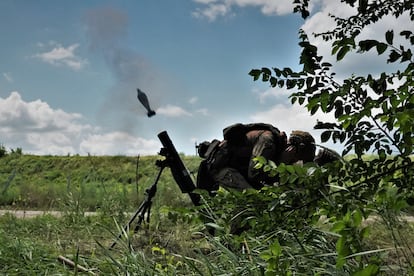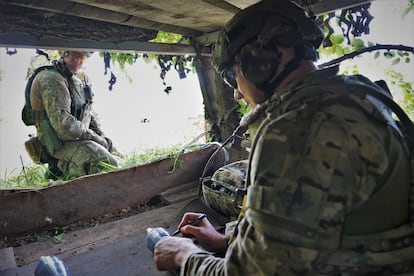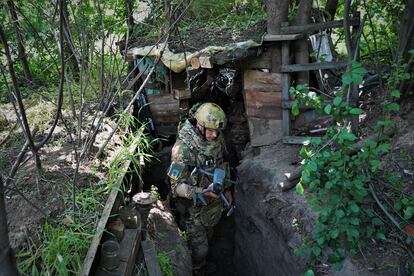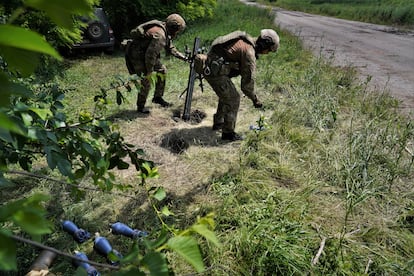Mortars with messages for Russian forces on the Zaporizhzhia front line
Members of the Ukrainian Police’s special forces are engaged in fighting in their home region, spurred on by the desire to liberate their relatives from the occupied zones


Adding a handwritten message to the projectiles launched at the enemy is a long-held ritual of war, the equivalent of a message in a book or on a bouquet of flowers, only in this case a poison-pen letter. Just two kilometers (1.2 miles) from the Russian defensive lines in the Zaporizhzhia region, a young soldier named Oleksandr removes a marker he carries in the first aid kit hanging from his camouflage uniform, which he uses to note down the time at which a tourniquet is placed on a wounded comrade. He also uses it to write messages on mortar bombs. A few meters away from him, Aleksei, Artem and Sergey (none of them provide their surnames for security) are well-versed in the ceremony. They unload the weapon from the back of their SUV and quickly mount the cannon on the bipod. The three of them have a special motivation to return to the frontline every day: some of their family members live in the area occupied by the Russians, where the Ukrainian counteroffensive is attempting to advance.
After the liturgy of the marker pen, these members of the special forces of the Ukrainian Police begin their operation. Their task is to bomb enemy positions identified by a drone unit the day before, some of whose members accompany and advise them. They provide the technology. Oleksandr, Aleksei, Artem and Sergey, the traditional but effective mortars. Sergey complains that there are “clouds, and the wind is a bit gusty.” The inclement conditions, however, do not hinder their plans.
A few seconds later, the first crunch of a mortar sounds dryly in the air. It bears the name of a newly built housing development in the west of Kyiv. The construction company carrying out the work has provided the financing for this attack to be carried out. A second mortar spits out of the smoking iron mouth bearing the name of a fallen comrade whose wartime nickname was Tefal. For posterity, and to be able to send the souvenir to interested parties, the last thing they do before loading the cannon is to take a picture of the mortars with a cell phone.

Both the Russian and Ukrainian armies use this form of message exchange. The notes are usually filled with hatred, irony, good wishes for their own troops or as a reminder of those who have lost their lives in the conflict, as in the case of Tefal. Sometimes they are cryptic. Others are a direct stab. “Happy New Year!” read one on the wreckage of one of the drones that attacked Kyiv in the early hours of January 1.
The position from which the mortars were launched is between Mala Tokmachka, in Ukrainian hands, and Novopokrovka, a small locality occupied by Russian forces. This front of the southern region of Zaporizhzhia is one of the focal points of the counteroffensive. Two of the men are positioned in the shelter of a trench from where, through a screen, they control the flight of a drone that helps them to locate the points of impact and correct fire.
At the foot of the mortar, Artem, 33, oversees correcting the position by modifying the trajectory of the shot through a peephole. Sometimes he has to dig a little with a shovel to get the bipod’s ground anchors in place so he can alter the angle needed for the desired trajectory. “Fire!” shouts Sergey, 39, as a warning every time he shoves a projectile down the muzzle. They have just enough time to crouch down and hold their hands over their headphones. In little more than a second, the detonation is heard. “We repeat!” Sergey exclaims to Aleksei, 32, from inside the earthen trench once he has determined that they have hit their target.

Aleksei confirms they managed to hit the Russian trenches several times, but he cannot say for sure whether there are any casualties. “Sometimes we find out later from Russian reports about casualties in the battle. Some of our colleagues follow those enemy sources,” he explains.
Aleksei, Artem and Sergey are all residents of Zaporizhzhia and were already part of the police special forces before the war. Unlike other units that have been moving around on different fronts, they have remained deployed in their home region, apart from a few incursions into neighboring Donetsk. In addition to mortar attacks, they say, they carry out other missions such as occupying sniper positions or intelligence.
The three of them also confirm that they feel a special “motivation” and that they hope to make advances in the counteroffensive, as they wish to liberate their relatives in the occupied zone as soon as possible. Aleksei’s grandparents are in Tokmak; Artem’s parents are in Melitopol, and Sergey’s mother lives on the road toward Berdiansk.

Melitopol and Berdiansk are two important cities that form part of the corridor along the Sea of Azov, which is essential for the logistics of the Russian Army and is the main objective of the current Ukrainian military campaign. First, they have to take control of localities at important crossroads such as Tokmak, still some 60 kilometers (37 miles) south of where they are firing their mortars. They talk to their loved ones less than they would like over the phone and, when they do, they always avoiding talking about the war. “The Russians know who we are and we have to protect our families,” Aleksei says.
The asphalt of the road on which they retrace their steps after completing their mission is pockmarked with shell holes. Some have left craters more than a meter deep. The constant sound of fighting in the air from other positions nearby provides a reminder that the front is a little further ahead. Deputy Defense Minister Hanna Maliar acknowledged Tuesday that Ukraine is encountering fierce resistance from the Russians, which explains the slow progress being made after nearly three weeks of the counteroffensive. Aleksei plays it down. He and his comrades know that they are only at the beginning of an operation that, “unfortunately,” is going to keep them occupied for a long time. But their morale remains intact. “This is our last chance. We don’t want another Soviet Union. We will destroy them,” says Aleksei.
Sign up for our weekly newsletter to get more English-language news coverage from EL PAÍS USA Edition
Tu suscripción se está usando en otro dispositivo
¿Quieres añadir otro usuario a tu suscripción?
Si continúas leyendo en este dispositivo, no se podrá leer en el otro.
FlechaTu suscripción se está usando en otro dispositivo y solo puedes acceder a EL PAÍS desde un dispositivo a la vez.
Si quieres compartir tu cuenta, cambia tu suscripción a la modalidad Premium, así podrás añadir otro usuario. Cada uno accederá con su propia cuenta de email, lo que os permitirá personalizar vuestra experiencia en EL PAÍS.
¿Tienes una suscripción de empresa? Accede aquí para contratar más cuentas.
En el caso de no saber quién está usando tu cuenta, te recomendamos cambiar tu contraseña aquí.
Si decides continuar compartiendo tu cuenta, este mensaje se mostrará en tu dispositivo y en el de la otra persona que está usando tu cuenta de forma indefinida, afectando a tu experiencia de lectura. Puedes consultar aquí los términos y condiciones de la suscripción digital.








































